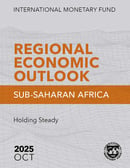This web page provides information in on the activities of the Office, views of the IMF staff, and the relations between Kenya and the IMF. Additional information can be found on Kenya and IMF country page, including official IMF reports and Executive Board documents in English that deal with Kenya.
At a Glance
- Current IMF membership: 191 countries
- Kenya joined the Fund in February 3, 1964; Article VIII.
- Total Quotas: 542.8 Million
- Loans outstanding: Stand-by Arrangement SDR 352.82 Million SCF Arrangements SDR 135.70 Million
- Article IV/Country Report: January 17, 2024. (IMF Country Report No. 24/13)
Office Activities
What is the new Kenya program?
Kenya has large financing needs on account of the adverse effects that the COVID-19 pandemic has created. The government has developed a medium-term reform program to address the challenges, articulated by the fiscal framework laid out in the recent Budget Policy Statement. The IMF is providing policy advice and financing to support the government’s program.
June 15, 2021
Statement on Standard Media Article
Fraudulent Scam Emails Using the Name of the IMF
For more information please see Fraudulent Scam Emails Using the Name of the IMF
IMF's Work on Kenya
No results found. Either there was an error with the web service or there is no data returned by the web service.
Regional Economic Outlook
October 16, 2025

The outlook for Sub-Saharan Africa is showing resilience, despite a challenging external environment with uneven prospects in commodity prices, still tight borrowing conditions, and a deterioration of the global trade and aid landscape.
Read the Report
Departmental Papers on Africa
 The Departmental African Paper Series covers research on sub-Saharan Africa conducted by International Monetary Fund (IMF) staff, particularly on issues of broad regional or cross-country interest. The views expressed in these papers are those of the author(s) and do not necessarily represent the views of the IMF, its Executive Board, or IMF Management.
The Departmental African Paper Series covers research on sub-Saharan Africa conducted by International Monetary Fund (IMF) staff, particularly on issues of broad regional or cross-country interest. The views expressed in these papers are those of the author(s) and do not necessarily represent the views of the IMF, its Executive Board, or IMF Management.



